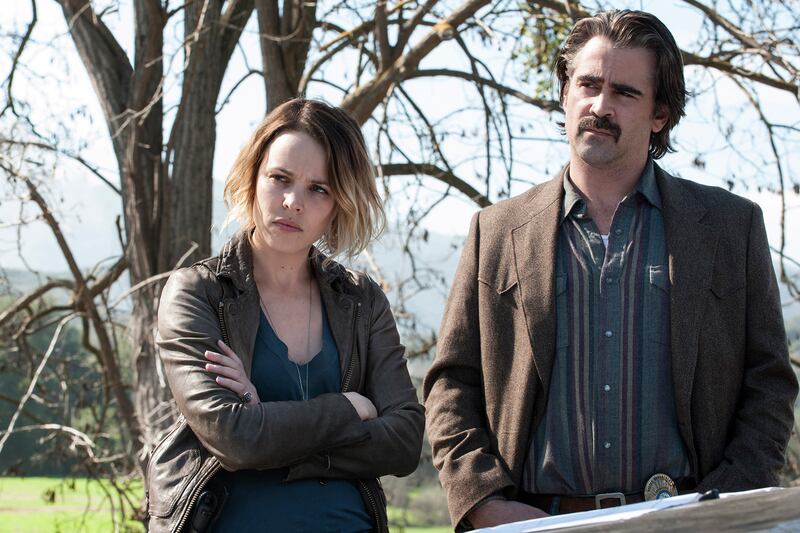A wrist-slitter of a dirge by Leonard Cohen is the gateway to True Detective’s second season, his gravelly, ruinously sexy tune “Nevermind” complementing an opening credits montage of Goth imagery transmogrifying into bleak landscapes. Yep, this ain’t Entourage, folks. This is a pitch-black show where even the slightest grin feels like a paroxysm of gaiety.
Welcome to Hell-A.
The first season of HBO’s potboiler True Detective was a bona fide phenomenon; a whodunit that provided an intoxicating blend of Bayou occult-mysticism, mystery, and machismo. It represented a unified front between creator (Nic Pizzolatto) and director (Cary Fukunaga, who helmed all eight episodes), and its stars—and real-life pals—Matthew McConaughey and Woody Harrelson, who seemed to reinvigorate each other as the detective duo Rust Cohle and Marty Hart. But the lion’s share of its success fell on the shoulders of McConaughey, who brought a tortured intensity and lyricism to lengthy monologues that would, in lesser hands, seem a tad overcooked.
By the time True Detective Season 1 had ended, having successfully chased that gross Spaghetti Monster out of his maze, the backlash began to set in. Never mind the thousands of subreddits created in its honor and copies of The Yellow King that were moved—a handful of influential detractors who’d branded the show everything from derivative to sexist had gained traction, and it only managed to eke out one Emmy for its direction. Now McConaughey is using those same monologues to sell Lincolns, and the series has been retooled to include a badass woman and a handful of men so neutered they either can’t reproduce or have serious sexual hang-ups.
The first of these sad men we’re introduced to is Colin Farrell’s Detective Velcoro. With his greasy, slicked-back mane and a mustache bushier than his brows, he is apparently doing everything in his power to fight the hot—as if his Sonny Crockett had decamped from Miami to suburban Los Angeles and traded in mojitos and hot Asian chicks for bourbon and trips to the OTB. He’s being interrogated by a potential attorney whose help he’s seeking in a custody case over his young, ginger son. If his dad bod and bolo tie didn’t scream “DEFEATED” loudly enough, well, after failing to impregnate his wife, she was brutally raped and assaulted, giving birth to the child he’s now fighting for. In the masculine world of True Detective, invirility comes with a heavy price—just ask Marty Hart.
After Velcoro flings a few stacks of money her way, the attorney asks him about any potential improprieties during his eight-year stint in the L.A. Sheriff’s Department prior to becoming a detective in the corrupt City of Vinci (population 95 and dropping).“I welcome judgment,” he says. And judgment is what this show is going to get in spades.
We soon discover that good ol’ Velcoro is full of shit. The very next scene sees him making a deal with Frank Semyon (Vince Vaughn), a local crime boss, who supplies him with the identity of his wife’s alleged attacker. And just in case you’d failed to grasp the Faustian nature of this exchange, the portal to the empty bar where the deal goes down is bathed in a hell-red hue. It’s the first in a series of telegraphed shots that all too clearly convey the foreboding nature of this show, including at least a dozen bird’s eye-view shots of this dark city of industry, a depressing maze of highways and factories.
Neutered Guy No. 2 is Semyon. We see him being dressed by his stunning wife (Kelly Reilly), as he jokingly remarks, “Behold what was once a man.” (We later learn that he, too, can’t get his wife pregnant, so they’re opting for IVF treatments.) He’s a midlevel crime boss gone legit, operating the Vinci Gardens Casino, but trying to stake a serious claim in the business world by spearheading the California Central Rail Corridor, a $68 billion project that will bring high-speed rail through central California. It’s co-architected by City Manager Ben Casper, who’s mysteriously gone missing. And if that weren’t enough, the local Vinci paper’s just run the first in an eight-part series on city corruption, so Semyon has his pocket-cop Velcoro look into it.
Neutered Guy No. 3 is Paul Woodrugh (Taylor Kitsch), an officer with the California Highway Patrol who’s on paid leave after a Lohan-like actress accused him of soliciting a blowjob during a traffic stop (she was full of shit, and a lot of drugs). He’s a military veteran with scars over half his body, and when he gets home to his randy girlfriend, he has to pop Viagra to get into it, and makes the most steely-eyed blowjob face you’ve ever seen.
All of these men are suffering from masculinity problems—but not Ventura County Detective Ani Bezzerides (Rachel McAdams), who has more testosterone than the three fellas combined. She’s a stone cold badass whose biggest piece of furniture in her Spartan pad is a wooden dummy she uses for stabbing practice. It’s complemented by a wall of knives and books on Hagakure (aka “The Book of the Samurai”) strewn about her living room. She’s also into rough sex—too rough for her boy toy, whom she kicks out of her pad when he can’t handle the heat.
All of these characters not only are tainted by bad police work—Bezzerides recently orchestrated a failed vice bust, running into her cam-girl sister in the process—but also have dark pasts.
The first pair of episodes of True Detective Season 2 were directed by Justin Lin (Fast Five), and the direction is transparently slick, with the aforementioned bird’s-eye shots contrasted with suffocatingly tight close-ups that recall Polanski. The visual pizzazz has replaced Pizzolatto’s elliptical monologues, which are virtually nonexistent during the pilot. One scene even has Farrell threatening a child, who bullied his son, with the line, “You ever bully or hurt anyone again, I’ll come back and buttfuck your father with your mom’s headless corpse on this goddamn lawn.”
Despite the dearth of quotable dialogue, it’s still a gripping opening salvo that does as good a job as it could servicing all these characters over the course of an hour, while dropping hints at the broad conspiracy to come. That includes the Panticapaeum Institute, a religious facility tied to a missing woman tied to a land deal (probably) tied to Semyon’s high-speed rail project, and led by a hippie-guru (David Morse) who also happens to be Bezzerides’s father; Casper’s ultra-kinky Vinci mansion, filled with iron-cast dildos and bondage art; and Woodrugh’s sketchy past at an outfit called “Black Mountain,” which sounds a whole lot like Blackwater. This thing runs deep.

The three cops’ paths cross at the body of Casper, who’s been transported in a red Cadillac—complete with a stuffed black eagle in the passenger’s seat—to a bench on the Pacific Coast Highway. His eyes have been burned out with hydrochloric acid. Since he’s discovered by Woodrugh, is located in Ventura County, and was declared missing in Vinci, it seems Bezzerides, Velcoro, and Woodrugh will have to team up on this ’un.
That should be fun to see, and the last shot of the trio staring at each other in slow-mo will definitely elicit chills (and thrills) over what’s to come. But I hope Pizzolatto and his revolving door of directors turn down the gloom switch a bit and amp up the dialogue and interactions among the compelling crew.
To say this first episode is “moody” would be a vast understatement. Its tone is epitomized by a scene later on in a bar where Farrell and Vaughn stare at each other emotionally, the camera moving back and forth for tight close-ups of their swelling eyes, as Lera Lynn’s “This is My Least Favorite Life”—the most melancholy song you’ve ever heard—is played live in the background.
“A good woman mitigates our baser tendencies,” Semyon tells Velcoro.
Let’s hope the same can be said for Ms. McAdams.





